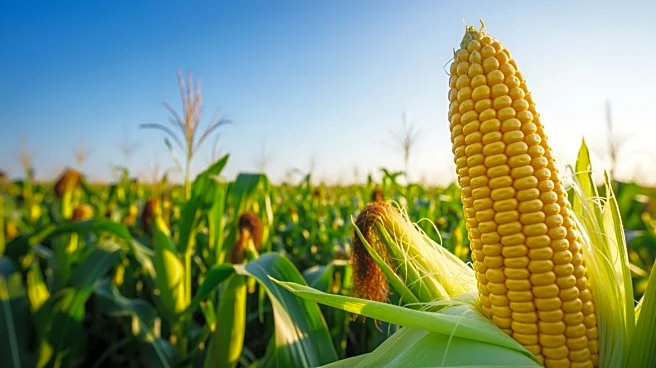What's Happening?
Growth Energy CEO Emily Skor addressed the Global Ethanol Summit, emphasizing the significant role of bioethanol in enhancing agricultural prosperity and strengthening global trade ties. Skor highlighted that U.S. bioethanol production has surpassed 10
billion gallons annually, with blending legal across all 50 states. She noted that the demand for U.S. corn and co-products like distillers' grains is rising due to increased global bioethanol use, particularly in countries such as Canada, Brazil, India, and Japan. Skor also pointed out that American producers have reduced carbon intensity by 20% over the past 15 years through improved farming efficiency and new technologies like carbon capture and sequestration.
Why It's Important?
The expansion of bioethanol use globally is crucial for the U.S. economy, particularly for the agricultural sector. As bioethanol demand grows, it supports U.S. farmers by increasing the demand for corn and related products, thereby boosting the rural economy. Additionally, bioethanol serves as a bridge fuel in the transition to lower-carbon energy sources, aligning with global decarbonization efforts. The U.S. stands to benefit from a trade surplus, reinforcing its position as a reliable energy and agricultural partner. This development could lead to stronger international partnerships and increased economic stability for rural communities.
What's Next?
As bioethanol continues to gain traction, the U.S. may see further growth in exports, potentially setting new records. This could lead to increased investment in bioethanol infrastructure and technology, further reducing carbon emissions and enhancing energy efficiency. Other nations might prioritize partnerships with the U.S. to leverage its expertise and production capacity in bioethanol, fostering international collaboration in sustainable energy solutions.
Beyond the Headlines
The push for bioethanol not only impacts the economy but also has environmental and policy implications. By reducing carbon intensity, bioethanol contributes to climate change mitigation efforts. The focus on bioethanol also highlights the intersection of energy and agricultural policies, emphasizing the need for integrated approaches to address global challenges. This development could influence future policy decisions and encourage other countries to adopt similar strategies.















